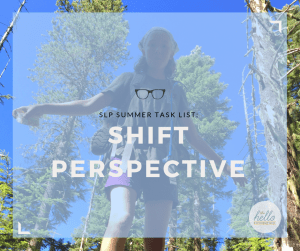It is about this time each July, when I remember why summer is so valuable to me professionally. In June, I rush out of the building and empty my mind of all work thoughts. I need the space. I need the clean sweep. But as the summer progresses, my passion for our field kicks in. I can’t help myself. Books, news stories, and podcasts trigger ideas. I’m jotting notes, and making lists. I realize the inspiring value of a shift in perspective.
As I explain to my elementary social skills Lunch Bunch, perspective is everything. Where you sit, what you see, and what you think colors everything about how you experience an event. It turns out, seeing things differently in July is a really important part of my summer!

Hello Foundation clinicians are reading The Whole-Brain Child this summer for discussions that will happen online and in-person as we start the new school year. This summer, the book has provided material for me to practice and notice my July perspective-shift. I can interpret and apply the new information from my children’s perspective, from my perspective as a parent, a spouse, or as a professional. We’ve had some great conversations this summer in my family about “mindsight”, the term Daniel Siegel uses to describe understanding what is going on in our own minds, and what is going on in the mind of another. It is a big perspective shift to try to interpret my child’s actions by thinking about what is going on in their brain, and maybe even harder to try to explain why I’m acting the way I am. There is truly never a dull moment when you think about everything your brain is managing!
My podcast-listening habits, though more selective in the summer, have also driven my shift in perspective. I actually lengthened a run so that I could finish listening to the July 8 episode of Invisibilia titled Frame of Reference. I heartily recommend this collection of perspective-shifting stories! The fact that one story focused on an adult with Aspergers was just a bonus. (Note: lots of questions and conversations to have with colleagues on this one. What is going on in the brain that magnetic pulses might influence interpretation of non-verbal communication? What is left when the effects disappear 30 minutes later? Can we as clinicians learn anything from this about how to use therapy sessions effectively?) Once you start thinking broadly about shifting perspective, you will see opportunities everywhere! There is no avoiding it.
With this in mind, I’ve decided to make the most of my perspective-shift during these last weeks of summer. As I relax into it, I become comfortable with the brain “stretching”. The new connections and broader thinking can make both my summer and the coming back-to-school season more rewarding. As we’ve discussed in our reading of The Whole-Brained Child, the physical architecture of our brain is actually changed “according to where we direct our attention and what we practice doing.” (p. 99) The more I exercise my shifting perspective muscles, the more naturally it comes, and the more easily I will be able to benefit from the same strategies during more stressful times.
I’ve done it. I’ve used my summer reading assignment and my basic knowledge of neuroscience to justify a really low-key end to summer vacation with lots of reading, poolside daydreaming, and family dinners. How will you spend your last weeks before school starts? How do you come back more “ready” than you left?





